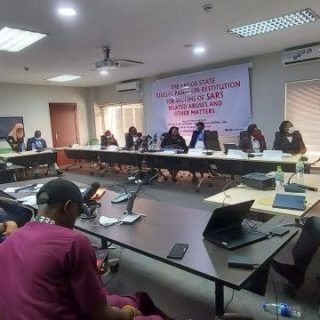Citizen is a column that explains how the government’s policies fucks citizens and how we can unfuck ourselves.
In Nigeria, unlike other countries, you cannot aspire to an elected public office without doing so on the platform of a political party.
Section 40 of the 1999 provides that every Nigerian shall be entitled to assemble freely and associate with other persons, and the person may belong to may political party, trade union or any other association that protects his interests.
Now, in the spirit of the #EndSARS Movement, you will agree with me that it is important for young Nigerians to be better aware about forming and maintaining political parties. Maybe police brutality in Nigeria would have stopped if our own party was in government.
How To Set Up A Political Party
Section 40 of the Constitution gives the Independent National Electoral Commission (INEC) the power to recognise political parties.
According to INEC, “a political association is an organisation or association of persons seeking registration as a political party in order to participate in an election by meeting all prescribed statutory requirements”.
Stage 1: Organisation
- The party needs a name, logo and acronym of the proposed party, and it must not be similar to any known registered political party or have any religious, tribal or ethnic connotation. For example, you can’t register “The Christian Party of Nigeria”.
- The party needs to have a Chairman, a Secretary, a State Executive Committee, and all officers must have been validly elected (INEC must receive a record of the proceeding of the elections).
- The party needs to have a draft Constitution, a draft Code of Conduct and a Manifesto. The constitution should contain how your elections are conducted and the administrative structure of the party, among other things.
- The draft Constitution must also reflect the Federal character principle of the 1999 constitution i.e all the leadership posts must be distributed fairly across the different geo-political zones in Nigeria.
- The headquarters of the proposed party must be in Abuja, and the party must be present in at least 24 states of the Federation.
Stage 2: Submission of documents to INEC
- The proposed party must pay a non-refundable fee of ₦1,000,000 (One Million Naira).
- It must obtain the appropriate form “PAI”.
- Within 30 working days, the proposed party must submit 50 copies of the draft constitution and the manifesto alongside other required information to the INEC.
- They must submit these documents with the name, signature and residential address of the Chairman and Secretary of the proposed political party.
- If all these supporting documents are not submitted within 30 days, INEC will terminate the application for registration, and the proposed political party will have to pay a fresh administrative fee of N1,000,000 (One Million Naira).
Read: How to Recall A Silent Senator
Stage Three: Verification and Post-Submission:
- Once these documents have been submitted, INEC will verify them for conformity with the guidelines.
- If INEC is satisfied that the party registration guidelines have been met, the party will be registered and a Certificate of Registration will be issued
- If all the requirements have not been met, INEC will notify the party of the reason for the refusal.
- The proposed political party may correct the errors in its registration documents without having to pay a fresh ₦1,000,000 (One Million Naira).
You can read this document for the complete guidelines on how to form a political party in Nigeria.
We hope you’ve learned a thing or two about how to unfuck yourself when the Nigerian government moves mad. Check back every weekday for more Zikoko Citizen explainers.




